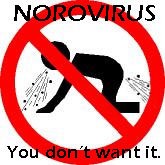We’ve successfully made it through a couple of months of school in our house without any illnesses. I’m not sure if my kids’ recent obsession with handwashing is a factor (I suspect it is) or whether we’ve just been lucky.
Kids and norovirus are a common pair. Last month an estimated 700 students missed school in Person County, NC with the virus (or stayed home to avoid it; only two cases were confirmed). Today, AP reports that 400 kids in northern Nevada at 11 schools likely have noro.
The Washoe County Health District said it believes the norovirus outbreak first started on Sept. 16 at a Reno elementary school, where 150 students and 11 staff members have reported symptoms, including nausea, vomiting, diarrhea and abdominal cramping.
As of Friday, the Washoe County School District reported that the outbreak had spread to 9 other elementary schools, a high school and some associated daycare centers. It has been centered in Reno, with one Sparks elementary school.
Most of the nearly 400 people affected have been elementary school children. The high school teachers who were sickened also traced their illnesses to the affected elementary school kids, whom they were related to.
“Elementary school kids, younger kids probably aren’t the best when it comes to hygiene,” said Phil Ulibarri, a county health department spokesman.
The school district has also been advised to thoroughly clean schools, which Ulibarri said means sanitizing a 25-foot radius where there is vomiting or diarrhea, including going as high as six feet up along walls.
Awesome, the Nevada folks are using the best available science.
